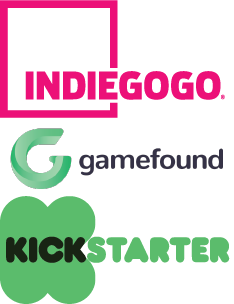Crowdfunding What’s, Do’s, and Don’t
by Nick Baker
For many in the tabletop gaming community, crowdfunding sites have become extremely popular ways to get products funded that may or may not have been seen as financially viable otherwise. These sites include places such as Kickstarter, Indiegogo, and Gamefound. For those not familiar with crowdfunding sites, these are sites that content creators set a financial goal and will put together some kind of product if they are able to raise enough funds. If they don’t, money isn’t collected and those who pledged towards those projects aren’t charged. There are often rewards associated with pledging money, and in the tabletop gaming world, that usually means some kind of product.
It’s important to note that the reason why folks crowdfund vastly varies depending on what the content creator is wanting to make. Board game companies often need the capital in order to physically produce the game components and ship things to customers. This can be anywhere from simple card games to lifestyle games filled with miniatures and deluxe components. RPG creators often offer PDF versions of their sourcebooks, which can be an inexpensive way to get ahold of their products. However, this isn’t the only option, instead pledges can be fancier books and potentially signed by the authors. In addition, there may be some very high pledge levels that let you be in the game or play with the designers.
All of this sounds cool, being at the edge between game design and game publishing, but there are a lot of caveats to worry about. First, these projects are not pre-order systems. There is no guarantee that you will actually get what you’re pledging for. There have been many documented cases where the publisher files for bankruptcy or simply takes the money and runs. Often times, projects are late. This can be months late or even years late. I’ve had a project fulfill over three years late, which was four years after pledging. Is this game you pledged for then still what you want now? Most projects do not offer money back guarantees. Another thing to watch for is shipping costs. Many projects now ask for shipping costs way after the initial project has funded, since they won’t know how much to charge for shipping. As the pandemic has taught many of us, shipping is getting more and more expensive. Having to pay an additional $20 just to get your game or book and not expect it can be frustrating.
So, what do you need to look for when browsing these crowdfunding sites? First thing to look at is whether the person putting together the project has done projects before. These sites leave up the history of what their previous projects were and you can see if the person or group has done a good job on the project before. Also pay attention to see if the groups running projects have any outstanding projects. Having many unfulfilled projects is a red flag to watch out for. It also helps to look at planned completion dates. If a board game is going to fulfill within 2-3 months after project funding wraps up, there’s a very good chance the person planning that game doesn’t really understand how logistics works. It is not unusual for board game fulfillment to be a year out from crowdfunding completion. Print & Play Games, PDF RPG books and zines can have significantly faster turnarounds since there are only digital items to be sent out, which also saves users on shipping costs.
Ask your friends if they are backing these same projects. This is useful for two reasons. First, if multiple folks really want the same project, saving on shipping costs can be a big deal. Second, there may not be a good reason for multiple folks to get that expensive $100+ board game when only one copy of it is ever going to hit the table. Expensive crowdfunded games have been making more and more appearances on these sites since many gamers aren’t looking to browse their FLGS to spend over $100 on a board game. See if there are free implementations or play throughs available to help give you more information on whether this product is right for you. Lastly, if the product is truly amazing, it won’t only be available on a crowdfunding site. You may not get 100% of the bells and whistles, but you’ll still get what makes the game good later. Don’t let the fear of missing out cloud your judgment.
Will that crowdfunded tabletop or RPG game make it in time for UCon 2021? It’s certainly a maybe, but do be aware that projects that are being shipped from China right now are running 2-3 months late simply due to ocean freight shipping issues, and those issues are not going away. I, for one, am sure hoping my crowdfunded copy of Return To Dark Tower makes it in time for an in-person UCon 2021 in November. Hopefully we’ll be seeing the rest of y’all there too.

